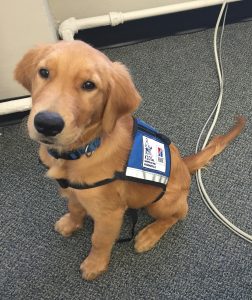Don’t be surprised if your consultant walks into a meeting on all fours! Well, maybe not your consultant but their helper in training. SAGIN has put the word “Care” into consulting. Over the past four years our consultants have participated in the early adoption and training of assist dogs. Ed Wierman, a Director in our Chicago office, has pioneered the effort to work with the KSDS program in Washington, Kansas. KSDS is a non-profit which has helped train and deploy assist service dogs for over 25 years placing over 500 assistance teams. KSDS provides guide and service dogs to people in need of assistance.
 The program begins with a puppy that is carefully screened and assigned to their new adoptive parent for a period of 18 months. Ed Wierman has served as an adoptive parent/trainer for three dogs in the program. Dogs are to live and socialize with their new parent. This means going to work with them and everywhere else they go, be it an office, plane, train, etc.
The program begins with a puppy that is carefully screened and assigned to their new adoptive parent for a period of 18 months. Ed Wierman has served as an adoptive parent/trainer for three dogs in the program. Dogs are to live and socialize with their new parent. This means going to work with them and everywhere else they go, be it an office, plane, train, etc.
These dogs are amazing and provide a vital service to those in need of assistance who are challenged with everyday tasks we take for granted. Guide dogs are specially trained dogs to provide mobility assistance for individuals who are blind or visually impaired to travel safely from one place to another. They do this by navigating sidewalks, finding curbs and stairs, crossing streets safely, and avoiding obstacles including hanging ones. Service dogs are specially trained to provide assistance to people with physical disabilities, from individuals who use wheelchairs for mobility to those requiring a steady four-legged partner to balance them as they walk.
Some of their skills include retrieving dropped or selected items, assisting in dressing and undressing, pulling wheelchairs, bracing for balance or transfers, turning lights on and off, and opening and closing a variety of different types of doors.
Facility dogs are specially trained to work with a professional in the field of education, counseling, medicine, rehabilitation, retirement or other specialty agencies. Facility dogs must complete and pass the health and temperament testing just like guide and service dogs. The facility dog will work many hours on obedience, mostly off lead, and will work with a variety of handlers. The dog must be calm, friendly and easily controlled by voice commands. The dogs are trained on how to approach and behave with children, adults, elderly and people in wheelchairs or with other forms of mobility issues. Facility dogs adhere to the same high training standards as service dogs.
Most of a person’s experience with an assistance dog comes long after the dog’s graduation day as we see them working in public. At SAGIN we are so proud of the hard work our consultants do not only in their everyday job but to take on the task of developing a puppy into a helping hand for those in need. The difficult day always comes when we see our trainees have to leave us, but we know they are moving on to bigger and better things. Most importantly KSDS provides these service dogs for free to their future owner.
If you would like to learn more about the KSDS program you can visit them at www.KSDS.org. If you would like to learn more about their dogs, contributing, or the experience of being an adoptive parent, you can contact Ed Wierman at ewierman@saginllc.com.